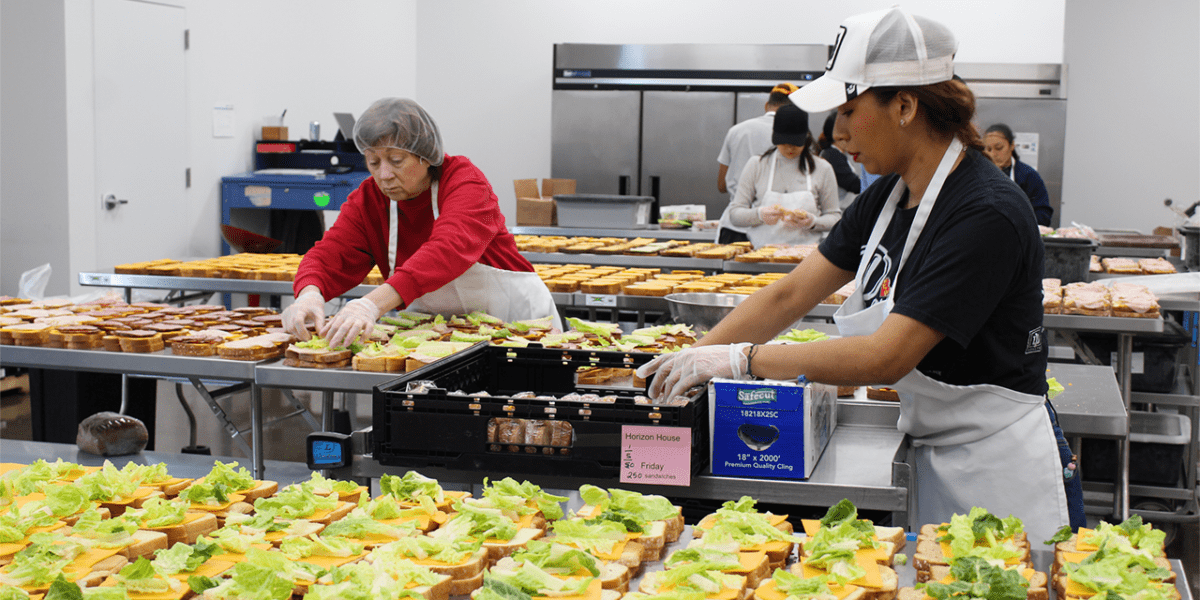Food is arguably one of the most important parts of the holiday season.
As families start to gather and spend more time in the kitchen, prioritizing food safety and reducing food waste is imperative. Before overindulging in turkey, stuffing and sweet potato pie, remember that there is an increased risk of food poisoning during the holiday season, and with the rising prices at the grocery store, many cannot risk tossing away uneaten food.
“We’ve seen times that food has sat out all day and then it’s refrigerated. That poses a big risk because it’s been left out at room temperature,” Tera Townsend, supervisor of food and consumer safety at the Marion County Health Department, said. “Especially for people who have weakened immune systems that they need to think about, that [sic] are also even more at risk.”
First, it is important to make sure the workspace or the area where the cooking will be done is clean and properly sanitized, Townsend said. Make sure to wash hands and utensils before starting to handle or prepare any of the food dishes.
READ MORE: Thanksgiving dinner: Where to find a free meal or turkey
Hands and utensils should also be washed in between handling raw meat or whenever tasting food or switching from one dish to another. Townsend said this helps reduce the risk of spreading bacteria.
Turkeys should be cooked to 165 degrees Fahrenheit. According to the Centers for Disease Control, raw and undercooked poultry can carry salmonella, which can cause nausea, vomiting and diarrhea.
Do’s and Do NOT’s
Do NOT rinse meat, Townsend said. Yes, you read that correctly. Do NOT wash or rinse the Thanksgiving turkey before preparing and cooking it because doing so can spread bacteria, Townsend said.
“I will address that there are some people that they are just going to rinse it off no matter what, so I would like to specifically say to not do it, but for those that will, to clean and sanitize the area around it,” Townsend said. “If they’re using a bleach solution to sanitize the area, it helps, but I would still like to say that it should not be rinsed.”
Do NOT put a frozen turkey in a deep fryer. It will explode and cause a fire.
Do NOT thaw a turkey in the sink at room temperature. The safest method to thaw a turkey is in the refrigerator for a few days before Thanksgiving. A 20-pund turkey should take approximately four days to defrost — so start early.
Do separate ready to eat vegetables and fruit from areas where raw meat is being prepared.
Leaving food out
More food items need to be refrigerated than most people think, Townsend said. Pretty much any food that will be saved for later or reheated to eat again — such as turkey, macaroni and cheese, greens, stuffing, yams, deviled eggs and fruit pies — should be refrigerated within two hours.
Any food left out at room temperature for more than two hours should be thrown away, Townsend said. After two hours, the risk of food borne illnesses increases. According to the CDC, Clostridium perfringens is the bacteria that grows in cooked foods left at room temperature. It is the second most common bacterial cause of food poisoning and outbreaks occur most often during November and December.
“The advice is to refrigerate within two hours — that’s anything that you’re going to want to refrigerate and use again,” Townsend said. “A way to keep it safe if they are wanting to leave it out is to maybe have hot foods hot held in crockpots or Sternos, if they’re paying attention to that, or if they have the cold foods on ice. They should not be out at room temperature.”
Leftovers and food waste
Leftovers should be kept no longer than three to four days in the refrigerator, Townsend said. However, there really is no hard-and-fast rule about how long to keep leftovers frozen. In general, if something starts to get freezer burnt, it is time to throw it away, Townsend said.

Leftovers often trip people up, said Linda Broadfoot, CEO of Second Helpings, a nonprofit organization that works to reduce food waste and fight hunger in Indianapolis. Especially during the holidays, people are often guilty of over preparing or fixing too much food and then tossing out leftovers that could have been eaten or donated, Broadfoot said.
“I know too many people who say leftovers aren’t good,” Broadfoot said. “I say if you’re going through all the trouble of making a big meal, you know, make enough so you can eat it and commit to eating it multiple times so that you save yourself that work.”
When people are not keeping leftovers too long, they are throwing them out too soon, and Broadfoot said people often toss food before it actually goes bad because the way food is dated and labeled can be confusing.
“I’m not a food scientist, but I would say, be mindful of what those really mean,” Broadfoot said. “Usually ‘sell by’ and ‘best by’ doesn’t mean the food is bad, right? So, I think folks end up throwing away a lot of good food because the dates trip them up.”
With the rising prices at stores, reducing the amount of food going to landfills starts at the checkout. It is important to try to only purchase the correct amount of food items needed for Thanksgiving to avoid unnecessary overstock, Broadfoot said.
Any unopened or unused dry goods and non-perishables can always be donated to Second Helpings, which is open six days a week, or other food pantries around Indianapolis.
“If it’s stuff you’ve already made, share with your neighbors, share with your friends,” Broadfoot said. “Before you throw it out, make sure you’ve got someone you know that doesn’t need it in your direct vicinity.”
Contact staff writer Chloe McGowan at 317-762-7848 or chloegm@indyrecorder.com. Follow her on Twitter @chloe_mcgowanxx.
Chloe McGowan is the Arts & Culture Reporter for the Indianapolis Recorder Newspaper. Originally from Columbus, OH, Chloe has a bachelor's in journalism from The Ohio State University. She is a former IndyStar Pulliam Fellow, and has previously worked for Indy Maven, The Lantern, and CityScene Media Group. In her free time, Chloe enjoys live theatre, reading, baking and keeping her plants alive.





